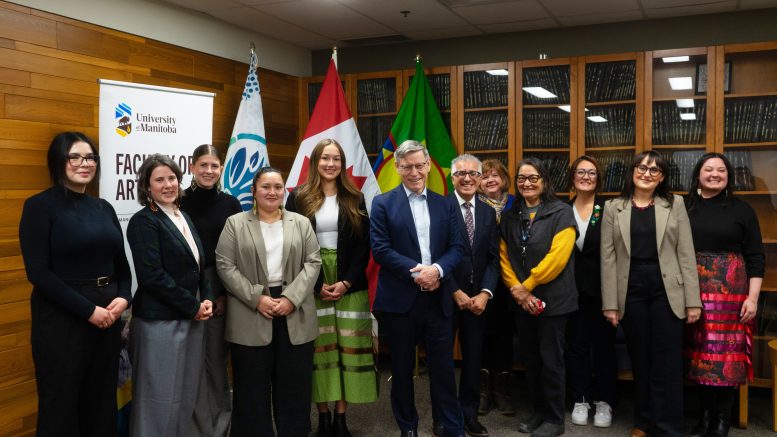The Government of Canada has announced an investment of $206,029 in the U of M’s Canadian Reconciliation Barometer project to show its commitment to advancing reconciliation between Indigenous and non-Indigenous peoples.
This funding announcement was made by Terry Duguid, member of Parliament for Winnipeg South, on behalf of the Honourable Pascale St-Onge, minister of Canadian Heritage, on Dec. 13, 2024, during an announcement in the Duff Roblin Building at the Fort Garry campus.
Duguid said, “with the important work we have to do in mind with respect to the reconciliation journey, today I am pleased to announce that the Government of Canada will invest more than $206,000 in the Canadian Reconciliation Barometer project.”
The Canadian Reconciliation Barometer project, which was launched in 2015, is an online survey designed to engage Indigenous and non-Indigenous individuals across Canada to explore their perspectives on the meaning of reconciliation to them.
The primary objective of this initiative is to track the evolving understanding of reconciliation within communities and evaluate the progress toward achieving it.
Michael Benarroch, president and vice-chancellor of the U of M, highlighted the importance of the project, stating the significance of actively measuring and tracking the progress of reconciliation and decolonization.
“What reconciliation and decolonization means to people can be difficult to measure, but it is essential that we track progress — and hold ourselves accountable — which is why today’s funding announcement is so very welcome: The Reconciliation Barometer is a key tool for us all.”
The new funding will support the project’s ongoing efforts, including establishing an advisory council of Indigenous Elders and traditional knowledge keepers, fostering community relationships across Canada and creating educational materials to inform Canadians about progress toward reconciliation.
St-Onge also emphasized the government’s commitment to enhancing the understanding of reconciliation and its progress.
“Our government’s support for the Canadian Reconciliation Barometer project illustrates our commitment to continuing the essential reconciliation process between Indigenous and non-Indigenous people,” said St-Onge in a statement. “This new funding will help bolster efforts to deepen our understanding of the reconciliation process. Although we have made progress on our shared path so far, we still have much to do.’’
Katherine Starzyk, professor of psychology in the faculty of arts and founding member of the Reconciliation Barometer project, expressed her gratitude for the investment, saying “to the Government of Canada and especially Canadian Heritage, for this support, we say thank you, merci, miigwech, maarsii, háw’aa.”
She added, “because of this funding, we can continue to shed light on where we are in the long and winding journey toward reconciliation and foster mutually respectful relationships at both personal and systemic levels so that Indigenous peoples and others in Canada can enjoy the good life.”
The Canadian Reconciliation Barometer initiative is supported by the Canada History Fund, which aims to enhance Canadians’ understanding of the nation’s history, stories, people and systems of governance.



